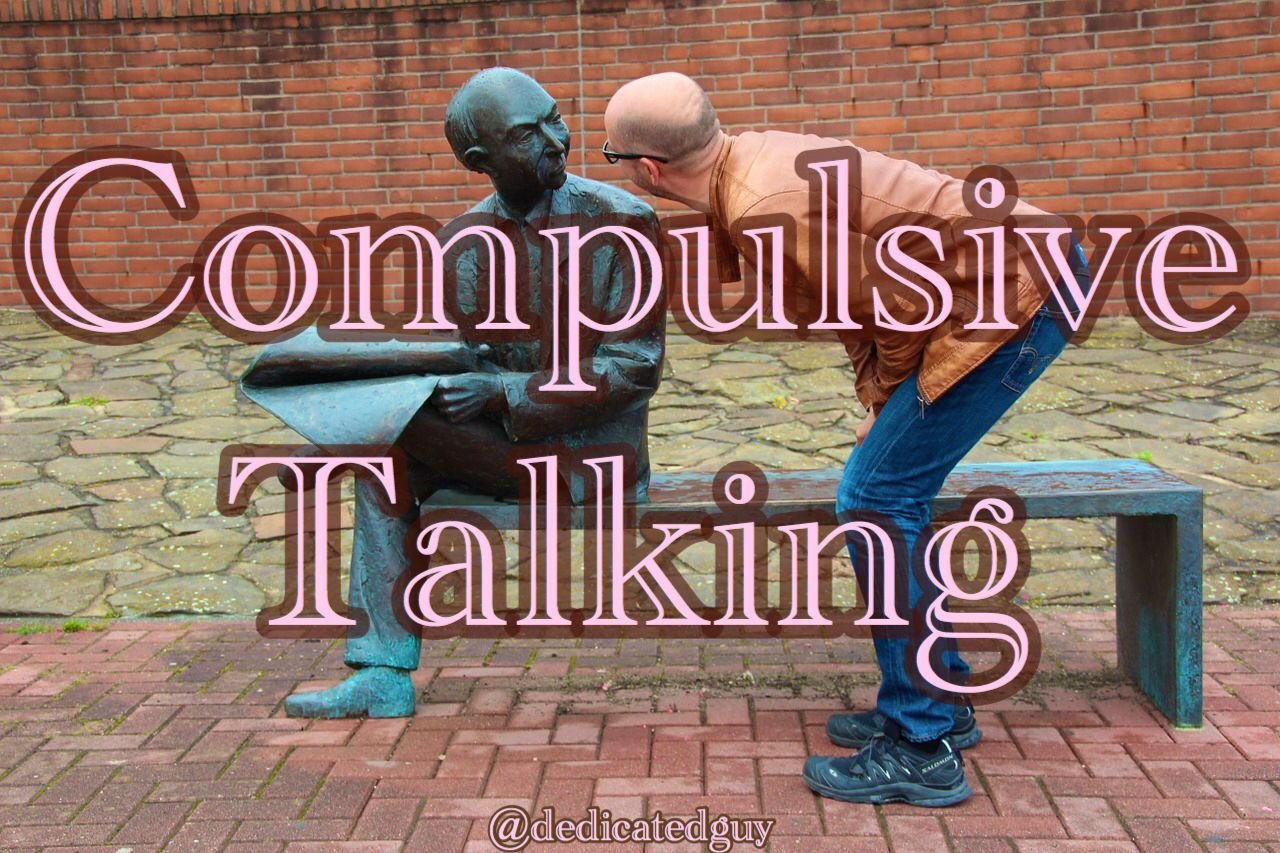
At the beginning they seem nice, easy going, and fun to talk with. But as time goes on their hearing them becomes exhausting, and we feel our energy being drained word after word. The problem is that it is a person who talks too much without stopping. When we say goodbye, we might end up feeling that there has been no conversation, that we have been a listener of a monologue with no end.
What happens to people who talk a lot and cannot stop? Why do they behave like this?

There is a concept that describes the tendency to speak a lot: compulsive talking. In fact, it is a symptom of some basic psychological problem, like for example manic episodes or anxiety attacks.

What is compulsive talking:
Compulsive talking is talking that goes beyond the bounds of what is considered to be socially acceptable. The main factors in determining if someone is a compulsive talker are talking in a continuous manner or stopping only when the other person starts talking, and others perceiving their talking as a problem. | Source
This problem consists in the acceleration of the speech and the difficulty to be interrupted. That is, the person talks too much and too fast making it very difficult to interrupt them, and even more difficult to pay attention to them.
In fact, sometimes the speech can become so incoherent that understanding its logic becomes difficult, which is caused by the person’s thinking going so fast that the central idea behind the monologue might get lost.
This is caused by the speed of the person’s thoughts, the course of their thinking goes faster than normal, so the speech is the manifestation of that speed. However, unlike people who talk a lot about themselves or their problems, in this case there is indeed a psychological disorder, like bipolar mania or hypomania

Pure egocentrism
People who speak excessively do not necessarily suffer from a disorder, sometimes it is simply egocentricity. When there is no fast speech, yet person only talks about his/herself, then it is likely for this person to have a personality with narcissistic features that make him/her believe that he/she is the center of the universe and that only his/her problems are important. For these people, it is normal for the conversation, or rather the monologue, to be always about them.
What is narcicism?
Individuals with this disorder exhibit a lack of ability to empathize with others and an inflated sense of self-importance. | Source

Actually, it does not even occur to them that their monologue can be boring or irrelevant to others. They are so self-absorbed in themselves that they assume that everything that happens to them is of general interest. These are people who give excessive talk about themselves on every occasion, but never listen, and they see the problems of others as not worthy of being taken into consideration.
People with this condition are frequently described as arrogant, self-centered, manipulative, and demanding. They may also concentrate on grandiose fantasies (e.g. their own success, beauty, brilliance) and may be convinced that they deserve special treatment. | Source
Behind those attempts to gather all the attention in the conversation, usually there is a great insecurity. People who talk a lot about themselves feel good when they get attention and others listen to it because they interpret it as a proof of their own value, their self esteem depends on other people constantly hearing them and only them.
The favorite topic of conversation by these people are obviously their own achievements, successes and past experiences, everything that can make them look good in the eyes of others. Therefore, deep down, that monologue is simply the manifestation of the need for constant self-affirmation. That monologue works as a facade to hide how they actually feel. The person does not want to listen but rather wants to be heard, and is through the eyes of others that this person sees him/herself, their image is the most important thing in the world.
Some symptoms of this issue are the following:
- Exaggerates own importance
- Requires constant attention and admiration from others
- Takes advantage of others to reach his or her own goals
- Disregards the feelings of others, lacks empathy
- Is often envious of others or believes other people are envious of him or her
- Shows arrogant behaviors and attitudes. | Source

The never ending talk
The monologue’s content of is also important to realize what is happening to the people with this condition. While the person with narcissistic and egocentric traits usually bases the speech on previous successes, there are other people who only talk about their problems and difficulties.

In these cases our problems do not pass into the background but are rather erased completely from the conversation. These are people who interrupt when you speak because your difficulties, conflicts and problems are not as big and important as theirs, so they believe they have the right to monopolize the entire conversation.
They end up diluting our energy since the conversation is reduced to a string of complaints. People who only talk about their problems always find a reason to be sorry, and are unable to see the positive side of life.
What is a victim mentality?
Having a a ‘victim mentality’ means you blame your challenges in life on others around you, even if you can’t prove their negative actions. You might also blame many things on circumstances, which you see as always unfair. | Source
Basically, these people, like the narcissists, are totally consumed by their ego and have a serious lack of empathy, which prevents them from realizing that others also might have problems and need support or at least deserve to be heard as well.
However, unlike the narcissists, these people choose to become the center of attention by adopting the role of victims. In a certain way, making others feel sorry for them becomes a strategy of manipulation.

Why would people loudly and publicly proclaim themselves as victims? Perhaps a better question, based upon the level of secondary gain, attention, protection and support received by these people, is why wouldn’t they? With all of the attention on the issue, why are we surprised when people are exaggerating, using, or downright lying, about victimization?. | Source
It is like a system which goal is to deceive by the use of words, and it is quite perverse because while with the narcissist we do not usually have problems to stop the never ending monologue of achievements, with people who only talk about their issues we enter in an uncomfortable dynamic, because in a way, their problems can catch us, so we might end up feeling compelled to listen to them and pity them.

Conclusion
Every conversation, in order to something rewarding , requires the participation of everyone involved. However, it is very important to be able to tell apart people who talk a lot because of a disorder from those who monopolize the speech by an excess of ego.
When you meet people who cannot stop talking and rarely listen, it is probably the best to eventually inform them very clearly but in a non aggressive, friendly way, that in a conversation it is as important to talk as to listen, and if you feel that this relationship is affecting you, draining your emotional energy, you will have to set limits and move away from it.
References
Wikipedia – compulsive talking
heraldandnews – excessive talking
harleytherapy – victim mentality
Image sources
All images are from pixabay

If these titles sound interesting to you, I assure you the articles will be even better!

Let’s talk about emotional intelligence
Today's lesson: the importance of developing our empathy
Why some people cannot control themselves when shopping?
“A day in the future”: blind people, now with better vision than you
Let’s talk about Intuitive Intelligence, taking choices thanks to our gut
Let's talk about how the unconscious can affect us in our lives
Today’s lesson: Emotions and its connection with Psychology
